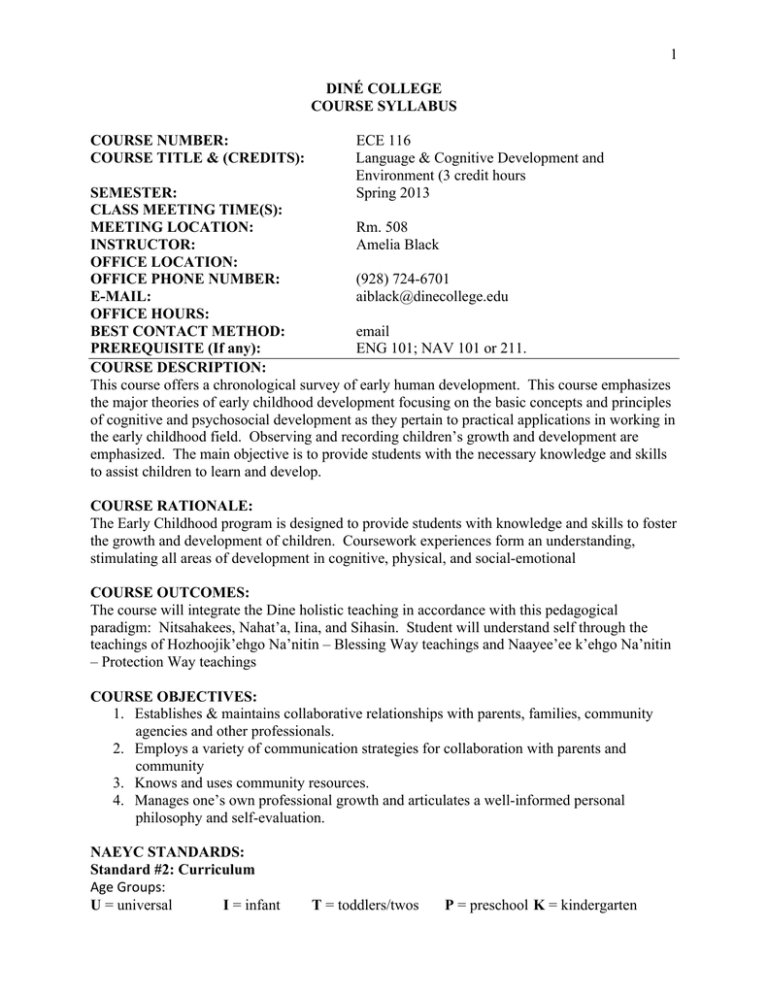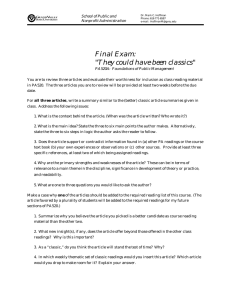1 Language & Cognitive Development and Spring 2013
advertisement

1 DINÉ COLLEGE COURSE SYLLABUS COURSE NUMBER: COURSE TITLE & (CREDITS): ECE 116 Language & Cognitive Development and Environment (3 credit hours Spring 2013 SEMESTER: CLASS MEETING TIME(S): MEETING LOCATION: Rm. 508 INSTRUCTOR: Amelia Black OFFICE LOCATION: OFFICE PHONE NUMBER: (928) 724-6701 E-MAIL: aiblack@dinecollege.edu OFFICE HOURS: BEST CONTACT METHOD: email PREREQUISITE (If any): ENG 101; NAV 101 or 211. COURSE DESCRIPTION: This course offers a chronological survey of early human development. This course emphasizes the major theories of early childhood development focusing on the basic concepts and principles of cognitive and psychosocial development as they pertain to practical applications in working in the early childhood field. Observing and recording children’s growth and development are emphasized. The main objective is to provide students with the necessary knowledge and skills to assist children to learn and develop. COURSE RATIONALE: The Early Childhood program is designed to provide students with knowledge and skills to foster the growth and development of children. Coursework experiences form an understanding, stimulating all areas of development in cognitive, physical, and social-emotional COURSE OUTCOMES: The course will integrate the Dine holistic teaching in accordance with this pedagogical paradigm: Nitsahakees, Nahat’a, Iina, and Sihasin. Student will understand self through the teachings of Hozhoojik’ehgo Na’nitin – Blessing Way teachings and Naayee’ee k’ehgo Na’nitin – Protection Way teachings COURSE OBJECTIVES: 1. Establishes & maintains collaborative relationships with parents, families, community agencies and other professionals. 2. Employs a variety of communication strategies for collaboration with parents and community 3. Knows and uses community resources. 4. Manages one’s own professional growth and articulates a well-informed personal philosophy and self-evaluation. NAEYC STANDARDS: Standard #2: Curriculum Age Groups: U = universal I = infant T = toddlers/twos P = preschool K = kindergarten 2 2.B. Areas of Development: Social-Emotional Development 2.B.01 U I T P K Children have varied opportunities to engage throughout the day with teaching staff who are attentive and responsive to them, facilitate their social competence, and facilitate their ability to learn through interacting with others. 2.B.02 U I T P K Children have varied opportunities to recognize and name their own and others' feelings. 2.B.03 U I T P K Children have varied opportunities to learn the skills needed to regulate their emotions, behavior, and attention. SUBJECT KNOWLEDGE LICENSURE OBJECTIVES: The following Professional Knowledge Objectives first introduced in ECE 111 are REVISITED in this course: 001.Understand human growth and development and how to use this understanding to promote learning and development in all domains. 002. Understand factors that may affect children’s development and learning and use this knowledge to create learning environments that support all children’s progress. 003. Understand integrated curriculum design that reflects the ways children construct knowledge. SUGGESTED ASSESSMENTS: • www.aepanesinc.com • terminology test SUGGESTED TEXT & RESOURCES: 1. Research articles will be posted on the web and assign during class 2. Materials in Rm.508 3. Laptop Materials: • Three-ring binder and tabs for portfolio (1 inch or 1 1/2 inch) • Loose-leaf lined paper • Chart paper • Blank cassette tapes or CD’s (2) • CD player or tape recorder (Borrow one if necessary) COURSE CALENDAR: Navajo language will be used 50% of the time in the classroom. Dates Topic/Objective: Readings: Assignments: Day 1 -Syllabus 1. Developmental Phases in EC Research Article Day 2 2. History & Theories of EC Chapter Readings Journal Assignment 1— Nitsahakees Application Assignment 2Search NAEYC Developmental Checklist 3 Development Journal Assignment 2 Nahat’a Day 3 3. Compare and Contrast to Dine Nitsahakees, Nahat’a, Iina, Sihasin phases/activity hands-on Chapter Readings Day 4 4.Language, play, literacy Dine and Western Materials to be handed out: Research articles and hand-outs Chapter Readings Day 5 Chapter Readings 5.Family and Community Day 6 Chapter Readings 6.Developing literacy skills in Dine and English Day 7 7.Cognitive skills and Infants and Toddler’s Large Motor Zone; Dramatic play zone; Messy zone; Quiet Zone Chapter Readings Day 8 8.Effective Social Play Chapter Readings Day 9 9.Infant and Toddler Language Development Chapter Readings Day 10 10.Child’s Physical Environment Chapter Readings Day 11 Guest Speaker tentative Chapter Readings Day 12 11.Family and Community Chapter Readings Day 13 12.Psycho-social skills 13.Social Development Chapter Readings Day 14 14.Receptive and Expressive Language Chapter Readings Day 15 15.Cognitive Skills Chapter Readings Day 16 Day 17 MID TERM 16.Indigenous Language Immersion Chapter Readings 1.Recording of Language 2. Analysis/presentation 3. Family and Community Newsletter 4. Journal Assignment 3 Iina Journal Assignment 4 Sihasin 2. Power Point Presentations 4 Day 18 17.NN Headstart Language Act 1995 Discussion Chapter Readings Day 19 Hands-on 18.Family and Community Chapter Readings Day 20 19.Dine Language Immersion Chapter Readings Day 21 20.Transforming materials for Dine EC classrooms Chapter Readings Day 22 21.Learning plans for EC ages Chapter Readings Day 23 22.EC and Sa’ah Naaghai Bik’eh Hoozhoon Chapter Readings Day 32 23.Power Point Presentations – ½ hour each Day 33 FINAL EXAM *Assignments are subject to change, this is based on formative assessment. STUDENT WORK/ASSIGNMENTS Work/Assignment Attendance & Participation (@ 50pts) Homework Interview(s) Self-introduction and Philosophy Inviting and Elder Portfolio Reading and Class Participation (5pts. Per session) Midterm & Final Exam Points 50 10 10 10 20 20 50 200 TOTAL ADDITIONAL REQUIREMENTS: • Turn all cell phones off at beginning of each class. • No children will be allowed in class sessions. • The Instructor is committed to dialogue and have class discussion. Dine language is encouraged during class discussions. Therefore, students are expected to 1. Participate in class discussions, 2. Complete reading assignments and; 3. Provided in-class assignment and homework. 5 • Students are encouraged to demonstrate the process of Dine Philosophy of Education: Nitsahakees-Thinking, Nahat’a-Planning, Iina-Living/Life and Sihasin-reflection and evaluation, throughout the course ATTENDANCE POLICY: Attendance and full participation is required for every class meeting. If weather or other circumstance forces us to cancel a class meeting, we will reschedule. Students are expected to attend all sessions. Attendance will be noted each session as follows: 1. +50 points if present for entire class, 2. +5 points if late or leave early, • After 6 hours of missing class, you will be dropped from the course. GRADING CRITERIA: A pre-determined number of points are given for all activities, projects, quizzes, and exams. All assignments are expected to be turned in on the date designated. Late work will NOT be accepted; that is, do not turn in any late work-it is automatically a zero (0), however if you do exceptionally well on assignments as compared to peers you might get extra points. GRADING SCALE: (passing grade is “C” or better) A = 90-100% B = 80-89% C = 70-79% ACADEMIC INTEGRITY: Students are responsible for the integrity of their academic work. Academic dishonesty includes the following: • Obtaining unauthorized assistance in any academic work • Cheating on a test • Plagiarism: Defined as a student using another student’s or another author’s work or ideas i.e. magazine, newspaper, web site, book, or other source(s) and submits it without giving that person or source proper credit. This is not allowed and students who commit plagiarism will be dealt with according to the Student Code of Conduct. Some of the penalties that may be imposed include, the choices of penalties are the decision of the instructor: • warning (written or oral) • reducing the grade for the assignment, test, or project • reducing the grade for the course • assigning a failing grade for the course • dismissing the student from the course and issuing a grade of “W” • academic probation or suspension; expulsion; and recording the decision in the student’s academic record Students who have been academically dishonest (including plagiarism) will fail the course. Prepared by Instructor Date Reviewed by Chair Date





